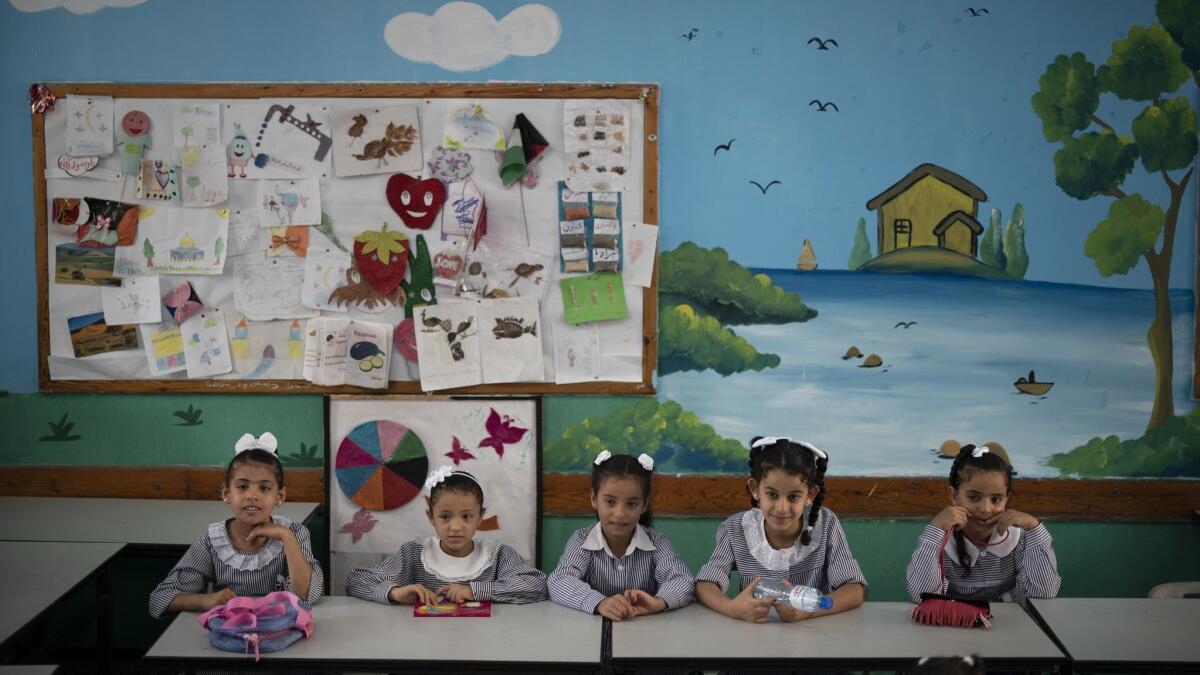Palestinians condemn U.S. ending funding for U.N. refugee agency

Reporting from JERUSALEM — Palestinians on Saturday condemned the U.S. decision to end its decades of funding for the U.N. agency for Palestinian refugees, calling it an attack on the Palestinian people and accusing the Trump administration of trying to remove sensitive core issues from the negotiating table as it says it is preparing a Mideast peace initiative.
The announcement raised new questions about the viability of any future U.S. peace plan. President Trump’s Mideast team, led by his advisor and son-in-law Jared Kushner, has been working on a plan for about a year and a half but has not said when it will be made public.
The Palestinians accuse the U.S. of being unfairly biased in favor of Israel, citing a series of steps by the White House. Trump has recognized Jerusalem as Israel’s capital over Palestinian objections and last week cut $200 million in development aid to the Palestinians. Friday’s decision cut an additional $300 million to the United Nations Relief and Works Agency, which serves millions of Palestinian refugees and their descendants across the region.
The Palestinians say these steps are aimed at imposing outcomes for two of the most sensitive issues in the conflict — the fate of contested Jerusalem and the plight of Palestinian refugees — without negotiations.
“What is the American administration doing? They are preempting, prejudging issues reserved for permanent status,” said Saeb Erekat, the chief Palestinian negotiator.
“They are undermining the moderate forces in Palestine and Israel,” he added. “Those elements that want to achieve peace peacefully based on a two-state solution are being destroyed.” He said extremists across the region had been given “gifts.”
UNRWA was established after the war surrounding Israel’s establishment in 1948 to aid the 700,000 Palestinians who fled or were forced from their homes. Today, it provides education, healthcare and social services to about 5 million Palestinians in the West Bank and Gaza Strip, as well as Jordan, Syria and Lebanon. The agency is also a major employer in the Palestinian areas.
The U.S. in recent years has supplied nearly 30% of UNRWA’s budget. But early this year, it suspended roughly $300 million in planned assistance, pending a review. Friday’s decision formally cut that money, as well as future assistance to the agency.
In a statement, the U.S. called the agency an “irredeemably flawed operation.” It said the U.S. was no longer willing to pay for a “very disproportionate share” of UNRWA’s costs and criticized what it called the agency’s “fundamental business model and fiscal practices” and its “endlessly and exponentially expanding community of entitled beneficiaries.”
The statement largely echoed Israeli claims that UNRWA perpetuates the conflict by promoting an unrealistic Palestinian demand that refugees have the “right of return” to long-lost homes in what is now Israel. Prime Minister Benjamin Netanyahu has said UNRWA should be abolished and its responsibilities taken over by the main U.N. refugee agency.
In Lebanon on Friday, the U.N. refugee agency’s commissioner, Filippo Grandi, ruled out taking on the Palestinian refugee issue. “No! The Palestinians in the region are the responsibility of UNRWA,” he said.
UNRWA’s spokesman, Chris Gunness, said the agency expressed “deep regret and disappointment” with the U.S. decision. He rejected “in the strongest possible terms” the U.S. accusations that its operations are flawed.
“These very programs have a proven track record in creating one of the most successful human development processes and results in the Middle East,” he said.
The European Union, the largest contributor to UNRWA with its member states, urged the U.S. to reconsider its “regrettable decision.” It said it would continue its assistance to the agency and discuss funding alternatives with other partners.
The U.S. budget cuts have already hit UNRWA hard. In an interview with the Associated Press last month, UNRWA’s commissioner, Pierre Kraehenbuehl, said his agency only had enough money to operate its hundreds of schools through the end of September. He said he is planning a major fundraising campaign to keep operations afloat.
More to Read
Sign up for Essential California
The most important California stories and recommendations in your inbox every morning.
You may occasionally receive promotional content from the Los Angeles Times.










